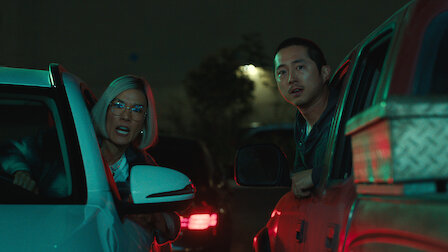Beef (2023), the latest Netflix original, stands out as a gem amidst Netflix’s vast catalog of mediocre content. The brilliant cast, with Steven Yuen and Ali Wong as the protagonists, and the dark, satirical writing makes the show equally harrowing to watch and impossible to put down. It is a masterful commentary on shame, and how it traps us in a perpetual cycle of avoidance and projection. Beef also takes a close look at Asian family values, delving into the harms of bottling up emotions and the weighty responsibility placed on children to live up to their family’s expectations.
Beef tells the story of a road rage incident that intertwines the lives of Amy Lau and Danny Cho, two very similar people living very different lives. As they seek revenge on each other throughout the series, we start to understand them as individuals. Their obsession with getting revenge almost becomes a way for them to escape the actual problems in their lives, and they end up using each other as a scapegoat for their frustrations.
In one episode, it is revealed that Amy’s husband, George, has cheated on her with her assistant, Mia. He describes the betrayal as purely emotional: they were “soul twins” – which I think is a fantastic way to describe exactly what Danny and Amy are. They’re both ticking time bombs of rage and self-loathing with extreme personalities, equally egotistical and broken. In the first phone call after the road rage incident, Amy and Danny berate each other with the very things they hate most about themselves. Danny accuses Amy of having a lonely and empty life, when in the first episode, we see him attempt suicide. Amy makes fun of Danny’s business and flaunts her material success, when we as the audience see her desperately trying to gather time to spend with her family, as she feels alien in her own home.
Danny and Amy also equally crave the reciprocation and acceptance of the people they love, and are terrified of revealing their true selves due to the fear of losing that affection. They’re both hell bent on playing the part of the “good person” and the “provider” of their families, which is why they end up using each other as the sole reason to blame for everything that goes wrong in their lives. Another reason behind this is their equally large egos.
Their egos prevent them from admitting their own faults, falling short of everyone’s expectations, and most importantly, healing.
The last episode of the series is absolutely brilliant, where both Amy and Danny experience ego death while hallucinating due to consumption of poisonous berries. They are finally able to open up to each other, at their very lowest, and can put themselves in each other’s shoes. Amy and Danny realize exactly how similarly broken they are, and they finally accept each other even after getting to know all their imperfections.
Another interesting plot point I’d like to touch upon is the burden of having to fight for your family’s approval. Amy’s suffocatingly optimistic husband is the perfect example of someone that hears your words, but doesn’t listen to you. Amy feels pent up rage and frustration which her husband refuses to let her express, and instead, immediately suggests meditation techniques and other methods to be calm. He fails to understand that sometimes being calm and rational isn’t the answer, and that Amy might just need someone to listen to her rant. Her husband’s actions are a reminder of her own family, where expressing herself was discouraged, and secrecy was the norm. Amy complies with her husband’s toxic positive outlook, because she feels like the moment she unwinds, he is going to see her for the “monster” she really is, and lose love for her.
Danny is the same when it comes to his brother, Paul. He wants to be the hero that protects and looks after Paul, but he falls short several times. He covers it up with lies and deception, as he too thinks that as soon as his secrets are out in the open, he will no longer have his brother’s affection and respect. This too stems from his experience with always trying to live up to his parents’ expectations.
And I have to mention the soundtrack — Steven Yeun’s acting during “Raise a Hallelujah” deserves all the praise it has gotten since the show’s release. If you catch me stifling a sob while watching everything go downhill for Amy and Danny to “Somewhere Only We Know” — Yes, I was crying. No onions to blame, only an amazing background score.
Overall, Beef was simultaneously cough inducingly funny and gut wrenchingly painful. It is nothing short of a masterpiece, and I’m very happy with how things ended in one season. Amy and Danny’s story feels complete, in the most disastrous yet perfect way — almost like surviving a car crash.






















